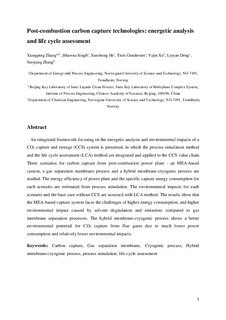Post-combustion carbon capture technologies: Energetic analysis and life cycle assessment
Journal article, Peer reviewed
Accepted version
Permanent lenke
http://hdl.handle.net/11250/2480740Utgivelsesdato
2014Metadata
Vis full innførselSamlinger
Originalversjon
International Journal of Greenhouse Gas Control. 2014, 27 289-298. 10.1016/j.ijggc.2014.06.016Sammendrag
An integrated framework focusing on the energetic analysis and environmental impacts of a CO2 capture and storage (CCS) system is presented, in which the process simulation method and the life cycle assessment (LCA) method are integrated and applied to the CCS value chain. Three scenarios for carbon capture from post-combustion power plant – an MEA-based system, a gas separation membrane process and a hybrid membrane-cryogenic process are studied. The energy efficiency of power plant and the specific capture energy consumption for each scenario are estimated from process simulation. The environmental impacts for each scenario and the base case without CCS are assessed with LCA method. The results show that the MEA-based capture system faces the challenges of higher energy consumption, and higher environmental impact caused by solvent degradation and emissions compared to gas membrane separation processes. The hybrid membrane-cryogenic process shows a better environmental potential for CO2 capture from flue gases due to much lower power consumption and relatively lower environmental impacts.

